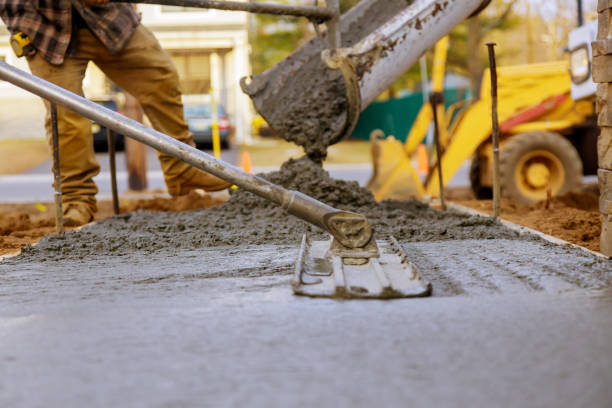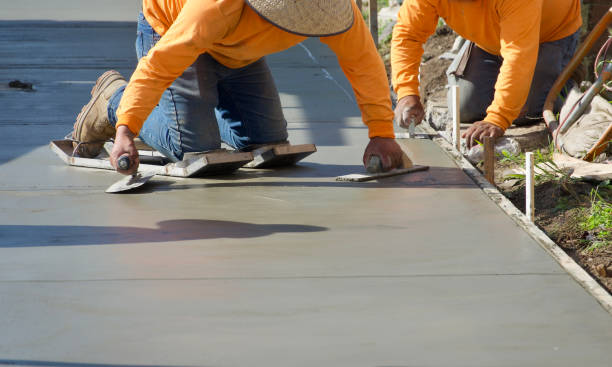Concrete sidewalks enhance safety and accessibility for Denver properties. Building them requires adherence to local codes and standards. Non-compliance can lead to fines or reconstruction. For Concrete Sidewalks Denver trusts, regulations ensure durability and safety. Asphalt Coatings Company helps navigate these rules for quality results.
Key Denver Codes for Concrete Sidewalks Denver
Denver enforces strict codes to ensure safe, durable sidewalks. These rules cover design, materials, and construction methods. Understanding them prevents delays and ensures compliance. Concrete Sidewalks Denver projects must follow city guidelines. Proper planning creates long-lasting, accessible walkways.
Width and Accessibility Standards
Denver requires sidewalks to be at least 4 feet wide in residential areas. Commercial areas often need wider paths, typically 6 feet or more. Accessibility is critical for ADA compliance, ensuring wheelchair access. Commercial Concrete Services Denver contractors prioritize these standards. Compliant sidewalks improve safety and usability for all.
Slope and Cross-Slope Requirements
Sidewalks must have a maximum slope of 1:20 for safe walking. Cross-slopes cannot exceed 2% to ensure accessibility. These rules prevent tripping hazards and ensure drainage. Concrete Repair Denver services address non-compliant slopes. Proper grading keeps sidewalks functional and safe.
Material and Thickness Specifications
Denver codes mandate a minimum concrete thickness of 4 inches for sidewalks. High-traffic areas may require thicker slabs, up to 6 inches. The concrete mix must meet strength standards, typically 4,000 PSI. Concrete Flatwork Denver professionals use approved materials. This ensures durability against Denver’s weather.
Importance of Compliance with Local Codes
Following Denver’s codes avoids legal issues and ensures safety. Non-compliant sidewalks may need costly repairs or replacements. Compliance also enhances property value and accessibility. Asphalt Coatings Company specializes in Concrete Sidewalks Denver projects that meet regulations. Adhering to codes protects your investment.
Avoiding Penalties and Redos
Building without permits or ignoring codes can lead to fines. Denver’s Department of Transportation and Infrastructure enforces strict penalties. Non-compliant sidewalks may require demolition and rebuilding. Commercial Concrete Contractors Denver ensure proper permits and inspections. This saves time and prevents legal headaches.

Permit and Inspection Process
Denver requires permits for new sidewalk construction or major repairs. Inspections verify compliance with width, slope, and material standards. Contractors must submit plans before starting work. Concrete Curb and Gutter Denver projects also need permits. Proper documentation ensures a smooth approval process.
Common Mistakes in Sidewalk Construction
Avoiding errors during construction ensures durable sidewalks. Mistakes can lead to early wear or non-compliance. Below are frequent issues to watch for.
Improper Base Preparation
A stable base is critical for sidewalk longevity. Poorly compacted soil or debris causes settling and cracking. Denver codes require a 4-inch granular base for stability. Concrete Flatwork Denver professionals ensure proper compaction. A strong base prevents cracks and uneven surfaces.
Importance of Drainage Planning
Poor drainage leads to water pooling, which erodes concrete. Denver codes require proper grading to direct water away. Standing water weakens the slab and causes cracks. Concrete Repair Denver services fix drainage issues. Effective planning keeps sidewalks dry and durable.
Using Substandard Materials
Low-quality concrete fails to meet Denver’s strength requirements. Weak mixes crack under traffic or freeze-thaw cycles. Always use high-grade, code-compliant concrete. Commercial Concrete Contractors Denver source premium materials. Quality concrete ensures long-lasting, resilient sidewalks.
Best Practices for Building Compliant Sidewalks
Following best practices ensures code-compliant, durable sidewalks. These steps prevent common errors and enhance longevity. Here are key strategies for success.
Hiring Experienced Contractors
Skilled contractors understand Denver’s codes and climate challenges. They ensure proper permits, materials, and construction techniques. Inexperienced teams may overlook critical details, causing issues. Concrete Sidewalks Denver experts like Asphalt Coatings Company deliver quality. Their expertise guarantees compliant, lasting results.
Regular Maintenance and Inspections
Routine checks catch cracks or uneven surfaces early, preventing costly repairs later. Denver’s weather can stress concrete, causing expansion, contraction, and surface wear. Regular sidewalk maintenance and concrete sealing extend the life of your walkways while maintaining compliance with local regulations. Concrete Repair Denver services address minor issues promptly through professional crack filling, surface leveling, and concrete restoration. Proactive concrete care keeps walkways safe, durable, and visually appealing for both pedestrians and property owners.
Conclusion
Building Concrete Sidewalks Denver properties rely on requires strict adherence to local codes. Proper width, slope, and materials ensure safety and accessibility. Hiring experienced contractors prevents errors and penalties. Asphalt Coatings Company delivers code-compliant, durable sidewalks tailored to Denver’s needs. Plan your project carefully to create safe, lasting walkways.
FAQs
What are Denver’s width requirements for sidewalks?
Denver mandates at least 4 feet for residential sidewalks and 6 feet for commercial ones. This ensures accessibility and safety. Commercial Concrete Services Denver contractors meet these standards. Wider sidewalks improve usability for all pedestrians.
Why is proper drainage important for sidewalks?
Drainage prevents water pooling, which erodes concrete and causes cracks. Denver codes require proper grading for water runoff. Concrete Curb and Gutter Denver services enhance drainage. This keeps sidewalks dry and extends their lifespan.
How often should sidewalks be inspected?
Annual inspections catch cracks or uneven surfaces early. Denver’s freeze-thaw cycles stress concrete, causing wear. Concrete Repair Denver services fix minor issues promptly. Regular checks maintain safety and compliance.
What happens if I don’t follow Denver’s sidewalk codes?
Non-compliance can lead to fines or required reconstruction. Denver enforces strict rules for safety and accessibility. Commercial Concrete Contractors Denver ensure proper permits and standards. Compliance avoids legal issues and costly repairs.







